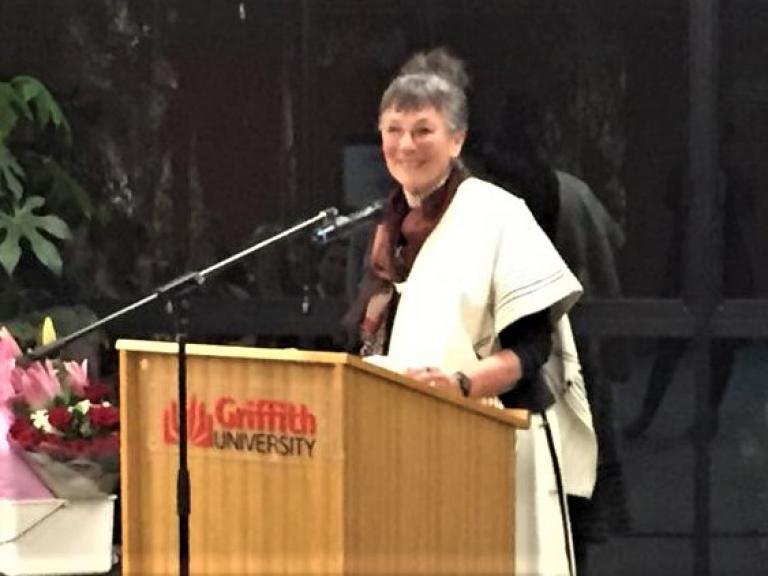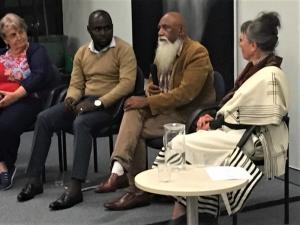
On a wet Brisbane evening on 6 October, 60 people from diverse backgrounds and origins came together at the Griffith University’s Multifaith Centre for a screening of the award-winning documentary Beyond Forgiving and a panel discussion on the theme ‘The truth will set us all free. Are we listening?’
Organizer Barbara Lawler reports: At the evening hosted by Creators of Peace in Brisbane, speakers discussed how Australia could become a country of healing and peace – and they stressed that the healing of the relationship between Indigenous and non-Indigenous Australians will be fundamental. ‘Beyond Forgiving’ tells the story of how Ginn Fourie’s daughter Lyndi was killed in a gunfire on a café during the last days of apartheid in South Africa. In the documentary, Letlapa Mphahlele, who organized the attack, tells how he was fighting against oppression of his people, and took personal responsibility for Lyndi’s death. Ginn admired his humanity, integrity and his spirituality. Nine long years after her daughter’s murder, she consciously gave up her justifiable right of revenge. The two have partnered together to build bridges between black and white communities.

Ginn also asked forgiveness in Letlapa’s village for the impacts of colonialism, which ultimately had incubated the apartheid system. Speaking about this to the audience in Brisbane, Ginn explained that South Africa and consulted Australian policy prior to adopting apartheid, and had adopted Queensland legislation as its basis. (The journalist Phillip Adams, writing in The Australian on 10 August, 2013, noted that apartheid was ‘a flash in the pan’ compared with the White Australia Policy, which began at Federation and lasted until 1973, ending during Gough Whitlam’s term as Prime Minister.)
Other speakers were Indigenous elder Pastor Darryl Lingwoodock from Hope Centre Services Indigenous Support, and Emmanuel Nkurunziza, youth worker and former Congolese-Rwandan refugee. Each had his own story to tell. Emmanuel’s father was killed by a neighbor when he returned from a refugee camp in Rwanda to his home village. Emmanuel first wanted to take revenge on this man, but something changed in his heart. He thought he needed to replace the desire for revenge with the desire to forgive. That started him on a new journey of life. Darryl recalled that Indigenous people were not recognized as human, in some places “to be shot and hunted down,” and that the Constitution needs to be changed, he also stated that Indigenous people needed to forgive the past in order to go forward into the future.
In discussions after the film screening, members of the audience thanked Darryl and Emmanuel for sharing their own stories, which included the pain, survival and their journey away from blame and revenge through gratitude and forgiveness to the inspiring lives they lead today as leaders in the community. Emmanuel, since arriving in Australia with little English, has trained and worked as a youth worker, receiving a nomination by TAFE Queensland North as Student of the Year category in 2016. He is a foundation member of CUPRA - Congolese United for Peace and Reconciliation in Australia. Darryl and his wife, Edwina, serve as First Nations Chaplains for UnitingCare and prisons across South East Queensland.
Lesley Bryant, academic and IofC supporter, summed up the evening, noting that Darryl had reminded us of how welcoming the original people of Australia are and how grateful we are to share this great land together. She posed the question to all, “After hearing these truths tonight, are we listening, as Darryl reminded us? Have we listened to the Uluru Statement? How can we be free unless we do?”
For more information about Brisbane events by Creators of Peace and Initiatives of Change Australia, contact barbara.lawler@iofc.org

